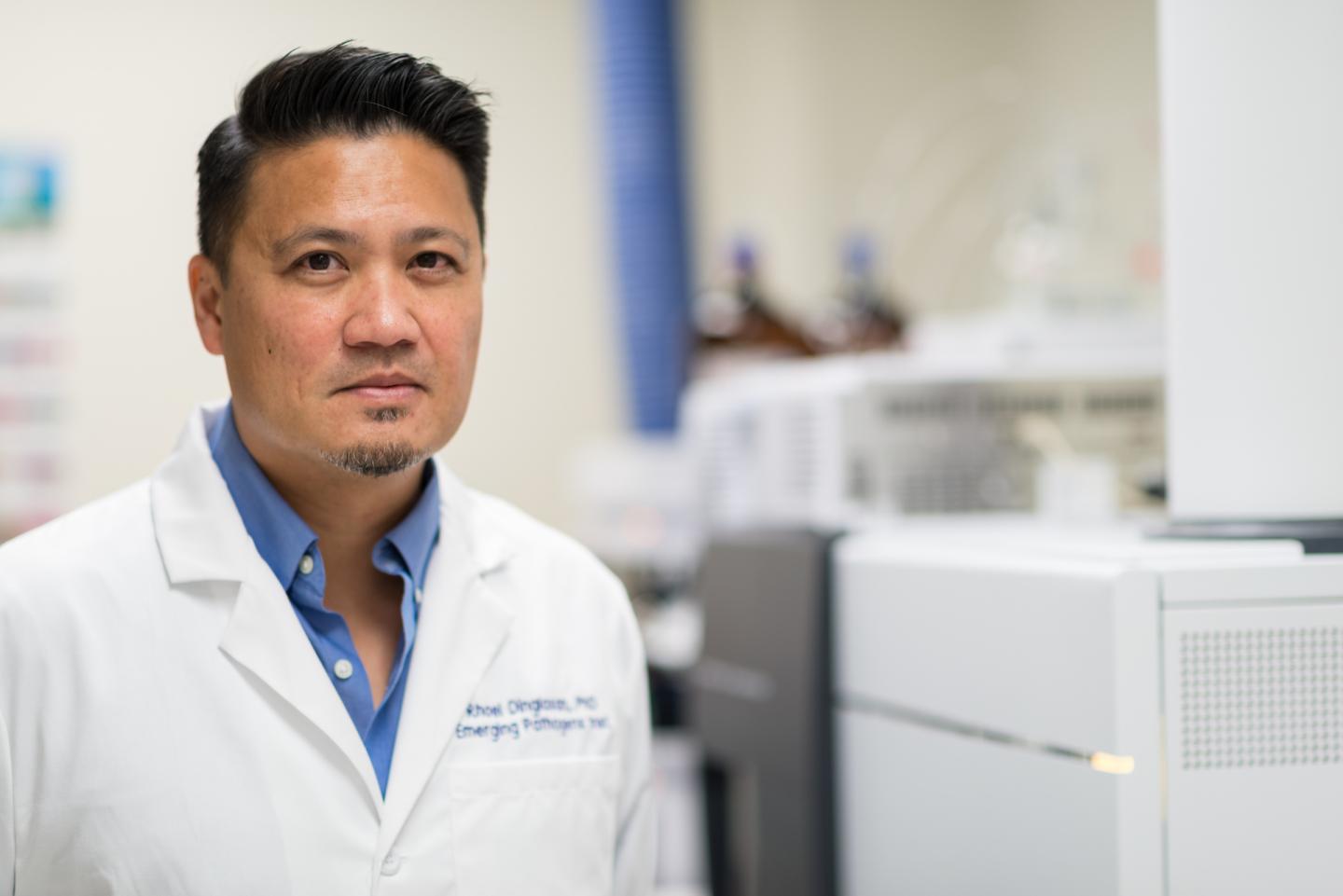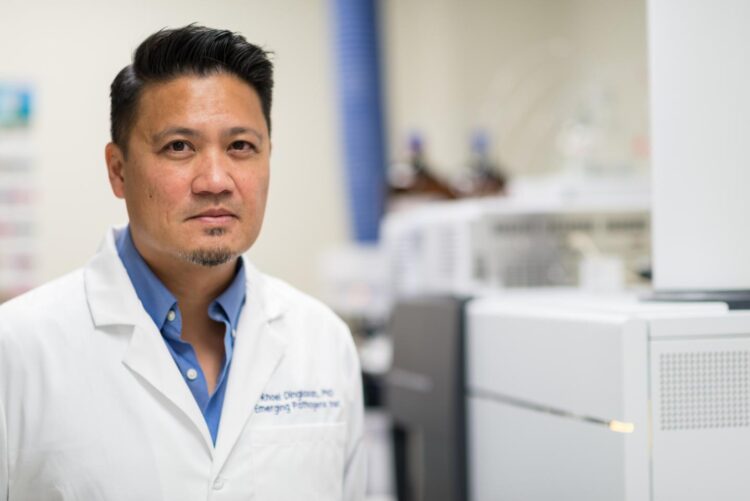When mosquitos ingest the blood of a person who has malaria but who has received the vaccine, they can no longer infect other people

Credit: University of Florida
University of Florida researcher Rhoel Dinglasan, Ph.D., was awarded $6 million today by the Global Health Innovative Technology Fund to test a new malaria vaccine in people. The process leading to a phase 1 clinical trial begins this April.
Dinglasan is a professor of infectious diseases in UF’s College of Veterinary Medicine, who joined the faculty under the state’s preeminence initiative. He has worked most of his career to end malaria which disproportionately affects people living in poverty in developing countries.
His vaccine has an unusual twist: It immunizes mosquitos against infection by the blood-borne Plasmodium parasites that cause malaria, after they ingest the blood of a person who has malaria but who has received the vaccine. After being exposed in this way, the mosquitoes cannot transmit the parasites and infect other people.
“Many of the existing malaria vaccines and drugs have failed because the Plasmodium parasites have coevolved with mosquitos and people,” says Dinglasan, who is also a faculty member in UF’s Emerging Pathogens Institute. “They know how to dodge our immune system and live within mosquitos, and that’s a hard game to circumvent. What we’re doing is completely different. We’re focusing on stopping the mosquitos from transmitting the parasites to people in the first place.”
The vaccine targets a surface molecule in the midgut of Anopheles mosquitoes that the parasites need to complete their life cycle. This molecule is not transmitted to people when they are bitten by the insects; but when introduced to animals in lab studies, the animals made antibodies against it. When these antibodies were introduced back into mosquitos along with Plasmodium, the parasites were blocked from infecting the mosquito. This breaks a key step in the malaria transmission chain.
“We’re immunizing mosquitoes,” Dinglasan explains. “We know that the concept works in laboratory studies, and now we need to begin testing if it also works safely in people.”
It’s an entirely different way of thinking about ending malaria. But Dinglasan says that disruptive thinking and innovative technologies are precisely what’s needed now.
Laying the groundwork
His team recently conducted surveys in Sierra Leone to evaluate whether people would accept a vaccine that would not prevent malaria in individuals immediately, but that would provide protection at the level of communities and nations. The findings were promising and have been accepted at Malaria Journal, where they are in press.
In 2007, Dinglasan identified a specific mosquito midgut protein, called AnAPN1, that could be a leading target for a transmission-blocking vaccine. Since then, with multiple rounds of funding from GHIT Fund, he has worked to develop a vaccine formula focused on eliciting an immune response to this protein within mammals. His research group then established a process to produce the protein in bacterial cells, named UF6b, for use in the vaccine formula. Recent tests in animals showed that the UF6b produced powerful and lasting transmission-blocking antibodies in animals.
Lab studies prove that Dinglasan’s transmission-blocking vaccine is effective against several known species and genetic variant strains of Plasmodium parasites that infect human and mice. Because it disrupts the life cycle in mosquitoes, the parasites are not thought to be capable of developing resistance to it — as they have to many anti-malarial therapies and drugs.
The next step is to test whether what works in the laboratory works in people and in communities where malaria is endemic. The first-in-human trial will begin in 2022 with a small number of people in Gabon to test its safety.
“It’s important to test this in the target population, and to let them tell us if it works or not,” Dinglasan says. “So many vaccines for malaria have failed because we tend to test them on Westerners and not account for the myriad of physiological and nutritional differences across populations.”
Mopping up malaria
Alongside the vaccine, Dinglasan is also developing a saliva-based diagnostic test that can detect whether someone carries the parasites that cause malaria, even if they don’t feel sick. Adults and children who harbor the parasites but don’t have symptoms are parasite reservoirs that transmit the pathogen when they are bitten by mosquitos. The infected mosquitos then pass the parasites to new, uninfected people and the cycle continues.
The new saliva-based diagnostic test can help pinpoint infected but symptomless people, who can then be treated and cleared of the parasites.
Dinglasan envisions using his saliva-based diagnostic and transmission-blocking vaccine in tandem to “mop up” residual malaria in areas where current tools have driven down the frequency of the disease, but not eliminated it. Although a huge funding investment from the nonprofit Gates Foundation has refocused efforts to eradicate malaria since 2007, the new gains have essentially driven malaria levels lower, but it’s proved difficult to produce further dramatic reductions in disease burden.
Dinglasan will partner with Ayola Akim Adegnika, MD, Ph.D., who directs the Centre de Recherches Médicales de Lambaréné in Gabon. The center is the clinical sponsor that will conduct the phase 1 trial.
“I am excited to be involved in this endeavor, which represents an important step in the longstanding efforts to reduce malaria transmission,” says Dr. Adegnika, a professor of immuno-epidemiology of infectious diseases at the University of Tübingen, Institute of Tropical Medicine, in Germany. “It will hopefully prove to be the crucial element for the realization of the age-old dream of living in a malaria-free world.”
Former director of the PATH Malaria Vaccine Initiative, Christian Loucq, M.D., says it is exciting to see Dinglasan’s concept moving toward a clinical trial.
“There are very interesting issues to be addressed in this project which span the technical, immunological, strategic, regulatory and behavioral,” says Dr. Loucq, who also formerly directed the International Vaccine Institute. “A transmission-blocking vaccine would be the most elegant solution to the problem of malaria.”
Dinglasan is the principal investigator and his global partners in the clinical trial include:
- Global Health Innovative Technology Fund (GHIT Fund), which is providing $6 million in funding to advance the vaccine into human trials.
- Ajinomoto Bio-Pharma Services, a biotech firm which will cGMP manufacture UF6b.
- Centre de Recherches Médicales de Lambaréné (CERMEL), the Gabonese research institution and clinical sponsor who will conduct the Phase 1 trial.
- University of Tübingen, Institute of Tropical Medicine, which will provide the clinical analysis platform for the clinical trial.
- CellFree Sciences Co. Ltd., a biotech company, which will assist Dinglasan in program management.
###
Media Contact
DeLene Beeland
[email protected]





